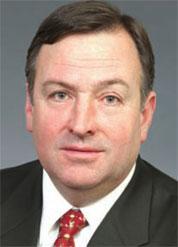Harry Schneider, '79: Hard Cases Need Great Lawyers

Trace the judicial history of the "war on terror," and you will find the name Salim Ahmed Hamdan at many critical junctures. Very near to that name you will find another: Harry Schneider, of the University of Chicago Law School class of 1979.
Hamdan was Osama bin Laden's driver. Apprehended in Afghanistan in 2001, he was among the first detainees transported to Guantanamo Bay. Initially held by the United States for more than two years without charge, Hamdan challenged his detention and the President's authority to try him before a military commission, resulting in the landmark 2006 Supreme Court case Hamdan v. Rumsfeld, which some have described as the Court's single most important decision regarding the limits of executive power. Two years later, Hamdan became the first prisoner to be tried at Guantanamo, in the first war crimes trial conducted by the United States against an enemy combatant since World War II.
Schneider, a partner at Perkins Coie in Seattle, represented Hamdan on a pro bono basis, along with other Perkins Coie attorneys. "It was such a fundamental issue, balancing the power of the President against the rights of the accused," Schneider says. "We were handed a gift, being asked to use our skills as lawyers in service of those principles that are the very foundation of our constitutional system of government, to be on the front lines as our nation resolved the difficult issue of whether devastating attacks would cause us to depart from the rule of law."
Hamdan's military attorney, Navy Lt. Commander Charles Swift, credits Perkins Coie for taking the case when others were reluctant to get involved. Schneider recalls, "It was courageous of the firm, given the climate of the times, but there was virtually unanimous agreement that this was the right thing to do, so we should do it."
The Perkins Coie lawyers, Swift, and Georgetown professor Neal Katyal filed the case that would become Hamdan v. Rumsfeld in early 2004. Two years later the Supreme Court ruled that President Bush had exceeded his authority; that decision halted not only the proceedings against Hamdan, but every other prosecution at Guantanamo.
"One tremendous satisfaction was receiving an amicus brief filed by my Law School professors Geof Stone and Richard Epstein, two faculty members who epitomize excellence in legal scholarship. That inspired me," says Schneider, whose practice previously had focused on intellectual property and corporate litigation.
Several months after the Hamdan decision, the President sought, and Congress enacted, legislation creating an improved system of military commissions at Guantanamo. Hamdan was among the first to be recharged, and his historic trial before a jury of military officers during the summer of 2008 was watched closely around the world. The combined team of military and pro bono lawyers shared responsibilities at the month-long trial. Schneider's role was to present Hamdan's opening statement and to cross-examine most of the government's witnesses who had interrogated Hamdan over the preceding six years.
Hamdan, who always admitted he had been a driver for bin Laden but denied he was a member of al Qaeda or otherwise involved in terrorist activities, was found guilty of material support based on his driving but was acquitted of the much more serious charge of conspiracy to commit terror related to the bombings of the US embassies in Kenya and Tanzania in 1998, the bombing of the USS Cole in 2000, and the attacks of 9/11. While the government asked the jury to send Hamdan to prison for life on the material support conviction, he was sentenced to just four months beyond time served. He was released in his home country of Yemen early in 2009.
Schneider says the trial's outcome provided a satisfying answer to the central question with which he had begun his involvement: "How would our country dispense justice at a time when it is under attack?" The jury's verdict, he observed recently, "represented a fair and just outcome in a place that was designed to be less fair and less just than what we normally expect in America. It proved true our pledge that this nation is a place where there can be 'justice for all,' even those deemed our enemies during wartime."
Schneider, who has worked at Perkins Coie since he graduated from the Law School, is married to his Law School classmate Gail Runnfeldt, who is also a Perkins Coie partner.